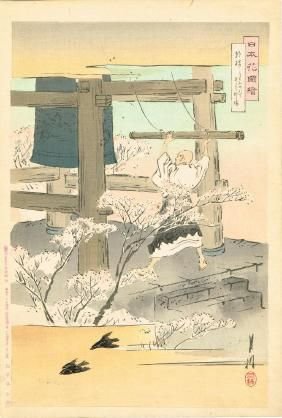The New Year Is Here, Whether We Will It or Not
The practice of writing is a good one that I would enjoy getting back into. The past three days I've had the extra time to do so. Let's see if it continues.
I thought today I'd share one of my favorite haiku poems, or hokku as it would have been known at the time. The new year is upon us and it always reminds me of this.
年とらぬつもりなりしが鐘の鳴る
toshi toranu tsumori narishi ga kane no naru
I intended
never to grow old…
the temple bell tolls
—Jokun
(trans. David LaSpina[1])

(“Cherry Blossoms in the Morning” by Ogata Gekko)[2]
Blyth put it best when he wrote about this haiku:
What a universal emotion is expressed in the first two lines! Making our peace with age is part of our acceptance of death.
The bell Jokun refers to is the New Years bell. On New Years in Japan, temple bells ring 108 times, one time for each of our desires. Called joya no kane (除夜の鐘), it is a purifying ritual of sorts, a way to start the year fresh.[3]
In pre-modern Japan, your age didn't go up on your birthday, it went up at the beginning of the year. So yes, basically everyone's birthday was the same day. But they didn't celebrate it as we do today. It was just a fact... oh, I'm older now.
Jokun hears the temple bells toll for the New Year and he is reminded that he has now gotten old, something he—like everyone—never really thought would actually happen.
Again, Blyth:
The bell speeding the old year comes sounding across the fields. We are a year older whether we will it or not.
That is, me! If you like this translation, feel free to use it. Just credit me. Also link here if you can. ↩
Lest you think the image doesn’t entirely fit the season, let me remind you that on the old Japanese calendar, New Years took place at the beginning of spring. ↩
They start ringing the bell around 11pm so that it can strike the last one at or shortly after midnight. Why 108? Various reasons are given depending on where you look. The number pops up a few times in other places. For example, Zen Buddhist priests often use prayer beads that consist of 108 beads. Some say the Buddha himself highlighted it as a special number. On the other hand, the Zen scholar D.T. Suzuki thought that it was due to a mistranslation from Sanskrit. There is also a theory that says it is a kind of numberology, based on the phrase shiku hakku (“8 unavoidable difficulties”, 四苦八苦): 四, shi, means 4, and 苦 is pronounced ku which sounds like 九 which means 9, and 八, hachi, means 8; so (4×9)+(8×9)=108. So, according to this idea, the 108 bell rings is to get rid of these 8 difficulties. ↩